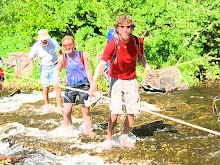We head back to America in November, which suddenly doesn't seem so far away. Like countless PCVs before us, Jillian and I have begun openly sketching out our first week at home. Dark beer, fresh seafood, Starbuck's, driving a car...aaahhh, I can feel the steering wheel now.
Today, on America's birthday and on a day in which most of the nation's newspapers reserve their editorial space for ponderings on our Great Experiment so many decades and centuries later, I'd like to mention something else I'm looking forward to: American nationality. That is, citizenship decoupled from ethnicity. Almost two years in the Balkans has given me the upmost respect and appreciation for being a citizen of a country where the two are separate.
For example: when Macedonians turn 18 they are required to apply for an identity card, which looks a lot like your basic American driver's license. These cards have nothing to do with driving, but they serve essentially the same purpose in providing a legal form of ID. On the card, right below name and address, is a category called "Nationality." What that really means is ethnicity (or family origin) and despite the card's explicit pronunciation of Macedonian citizenship, these cards emphasize the festering sores in this society--yes, everyone is a citizen of this country, but more importantly, someone is Macedonian or Albanian or Turkish or Roma. And that becomes their defining characteristic. I suppose the owner of the pub in Kumanovo has an ID which reads "Irish." But what if he's an Irishman of Scandanavian descent?
These cards bother me because they get to the heart of the matter when discussing nationalism and the pain it has wrought on this part of the world for over a century. [This is a topic I discussed with some 10th graders during my student teaching, but being in the Balkans has opened my eyes wide to this.] When you tie nationality to ethnicity, aren't you really saying, Everyone has their own country. So why don't you live there? Serbia for Serbians. Albania for Albanians. Macedonia for Macedonians. Etc.
You can forget all that stuff with Greece and the name--if Macedonia is truly going to make it as a nation it will require an internal conciliation between the country's ethnic groups. [By Balkan standards, Macedonia is quite multi-ethnic: 64% Macedonian, 25% Albanian, 4% Turkish, 3% Roma.] Superficial alliances (in politics and business, e.g.) come and go, but what about a genuine love for country that unites all citizens? That means patriotism over nationalism and not the sort of "nationality" spelled out on an identity card.
A friend put it to me like this once: In western Macedonia you can routinely see Albanian homes flying Albanian flags (that is, the country of Albania) from their roofs and not a single Macedonian flag can be found. Meanwhile, in the east, history teachers simply skip over all chapters and sections in the textbook that discuss the Albanian population in Macedonia.
The world is a richer place when peoples from all over can mix and share cultural and intellectual ideas in a free, open environment. It has helped to make America--which isn't perfect, of course--what it is today: the standard bearer for multi-ethnic relations. For cultural richness. For a national pride rooted in ideas, not skin color or family heritage.
Happy Independence Day.




